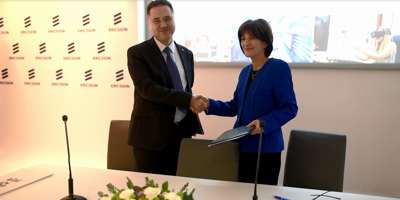News center
Collaboration Between Science and Economy - Increasing our Innovative Capacities
Categories: Agreements Events
On December 8, 2016, Ericsson Nikola Tesla company and the Faculty of Electrical Engineering and Computing (FER), University of Zagreb, have signed a framework agreement with the aim of bridging the gap between education and labor market, as well as boosting competitiveness of the Croatian economy. This agreement is a reasonable follow-up to a longtime and fruitful collaboration between Croatia’s biggest exporter of knowledge and our most famous research and educational institution in ICT, as well as a good example of how prudent innovation management and a high-quality partnership bring a measurable competitive advantage both to the science and the economy.
 Opening the ceremony, Gordana Kovačević, MSc, president of Ericsson Nikola Tesla, pointed out that innovation culture is a prerequisite for success on a dynamic global market and stressed the importance innovations have in the process of building the Networked Society, which improves the quality of people’s lives as well as industry and society at large. Darko Huljenić, PhD, one of Summer Camp founders and Manager for Technology and Scientific Activities in the company, briefly described how Summer Camp, as a form of collaboration which involves students as well, over the last 16 years has become a brand which is recognized not only in Croatia but also has many partners from abroad.
Opening the ceremony, Gordana Kovačević, MSc, president of Ericsson Nikola Tesla, pointed out that innovation culture is a prerequisite for success on a dynamic global market and stressed the importance innovations have in the process of building the Networked Society, which improves the quality of people’s lives as well as industry and society at large. Darko Huljenić, PhD, one of Summer Camp founders and Manager for Technology and Scientific Activities in the company, briefly described how Summer Camp, as a form of collaboration which involves students as well, over the last 16 years has become a brand which is recognized not only in Croatia but also has many partners from abroad.In his speech delivered after signing the agreement, Mislav Grgić, MSc, dean of the Faculty of Electrical Engineering and Computing, said that this was an example which proved that in the realization of a fruitful collaboration between industry and the University, it is still possible to successfully meet all the challenges. He also addressed collaboration models that were developed through cooperation, and where complementary qualities of both partners were used in the best way possible. He noted that, within this collaboration which, in various forms, has existed for over six decades, a large number of joint projects have been implemented at local, national, as well as EU level. In this context, special attention needs to be given to competitive research projects within EU programs, such as FP7, Horizon 2020, and the European Regional Development Fund (ERDF). Gordana Kovačević, MSc, president of Ericsson Nikola Tesla, expressed her thanks to everyone who has invested their hearts and knowledge so that this joint innovation journey, lasting for 64 years and encompassing 250 joint projects, could be so successful. She has expressed her great satisfaction with the fact that this collaboration would continue in attractive areas, such as Internet of things (IoT) and the fifth generation of mobile networks (5G), which should ensure that Croatia gets a more visible place on the global map of innovativeness and competitiveness.
Ericsson Nikola Tesla Communications
Search news

